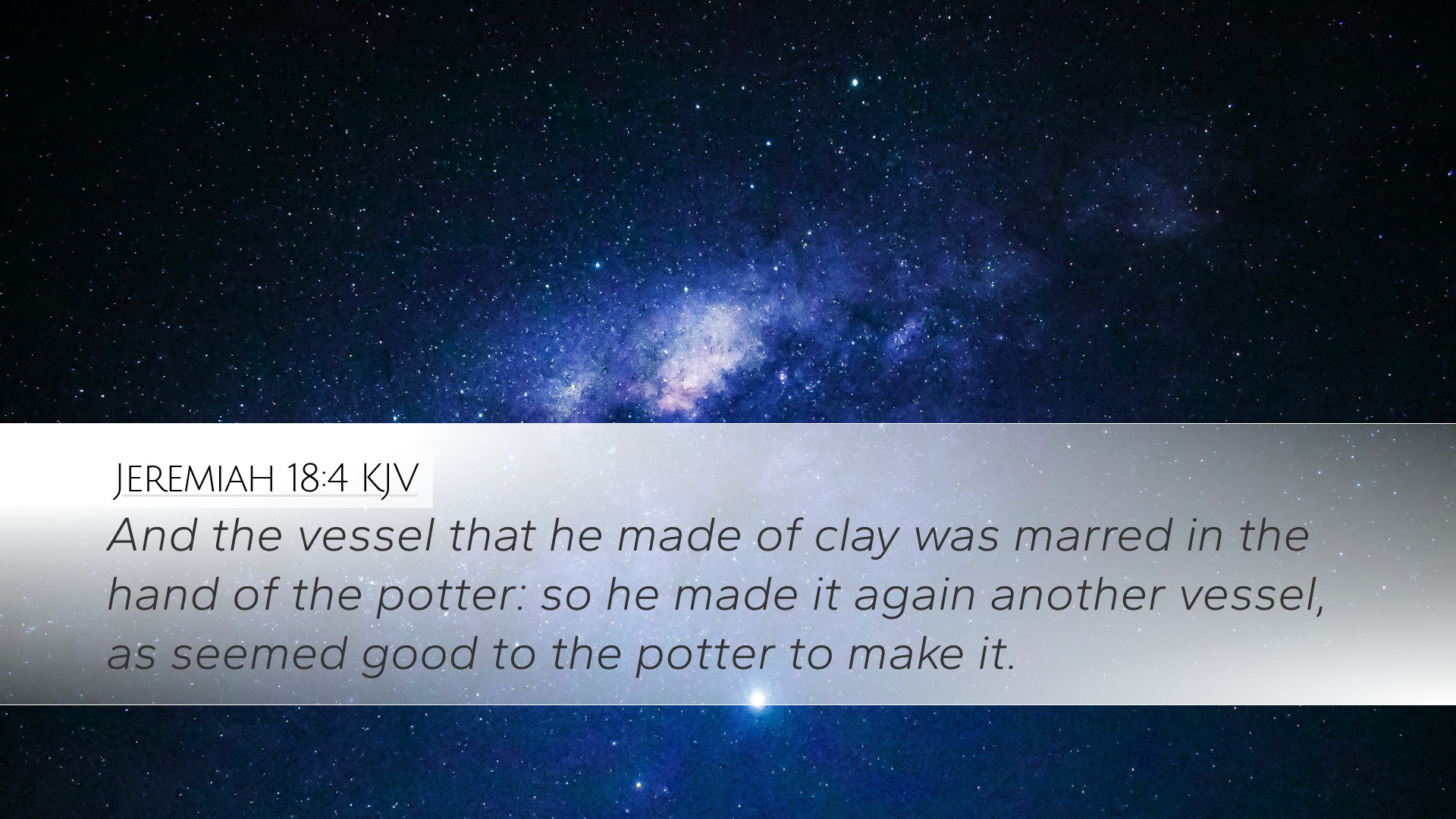Commentary on Jeremiah 18:4
Verse: Jeremiah 18:4 - "And the vessel that he made of clay was marred in the hand of the potter: so he made it again another vessel, as seemed good to the potter to make it."
Introduction
The passage of Jeremiah 18:4 captures a profound metaphor concerning God's sovereignty and the human condition. It presents a vivid image of a potter working with clay, which has become flawed. This imagery is foundational for understanding God’s intentions with humanity and His power to recreate and restore. The interpretations drawn from this verse facilitate a deeper understanding of divine grace, divine judgment, and the nature of God’s craftsmanship in our lives.
The Metaphor of the Potter
The metaphor of the potter and the clay is rich with theological implications. As noted by Matthew Henry, the potter represents God, while the clay signifies humanity. This relationship expresses the deep truth of divine authority and human submission.
- Divine Authority: The potter has complete control over the clay, mirroring God's omnipotence and sovereignty over creation.
- Human Susceptibility: The marred clay illustrates the reality of sin and human fallibility. Just as the clay can become damaged, humanity is subject to sin and errors.
- Recreation and Restoration: The potter’s ability to reshape the clay speaks of God’s grace and His desire to restore the brokenness of human life.
The Process of Marring and Reworking
Albert Barnes emphasizes that the process of marred clay is essential for understanding God's redemptive activities. When the vessel is spoiled, it is not discarded but remade. This action reflects several key aspects:
- Hope in Redemption: The fact that the potter does not abandon the flawed vessel offers hope to believers. It signifies that God's plans are not thwarted by our imperfections.
- Intentional Shaping: The potter's choice to remake the vessel indicates that God does not just fix brokenness superficially; He intentionally crafts us according to His purposes.
- Divine Patience: The patience of the potter contrasts sharply with human impatience. God's slow and deliberate work in our lives is a reflection of His love and commitment to our transformation.
God's Sovereignty and Human Agency
The dual themes of God's sovereignty and human agency are critical when interpreting this verse. As highlighted by Adam Clarke, while God has the power to mold and shape, there is an implied call for human response. The clay must yield to the potter’s hands.
- Yielding to God: A central lesson from the metaphor is that we must submit to God’s will to be effectively reshaped. Resistance can lead to greater fragmentation and damage.
- Responsibility of Response: While God initiates the work of transformation, individuals hold the responsibility to respond positively to God’s calling.
Theological Implications
Jeremiah 18:4 encapsulates vital theological themes relevant for pastoral ministry and scholarly reflection:
- The Nature of God: The portrayal of God as a potter signifies His inherent ability to create, recreate, and restore, reaffirming His sovereign character.
- Sin and Restoration: The marred clay symbolizes humanity's sinfulness, offering a powerful reminder that all have sinned and fall short of the glory of God; however, there is hope through Christ's work of redemption.
- Community and Individuation: This imagery can also be reflective of God's work among nations and communities, underscoring that while God deals with humanity collectively, He also attends to individuals personally.
Application for Pastors and Theologians
For pastors, the message of Jeremiah 18:4 serves as an inspiration for ministry focused on transformation. It reminds leaders to:
- Encourage Regeneration: Implore individuals to embrace God's transformative work in their lives.
- Emphasize Grace: Communicate the importance of God's grace in allowing for second chances and restorations.
- Bear With Flaws: Challenge congregations to see the beauty in the process of becoming and the lessons learned through trials.
Theologians can deepen the understanding of this verse by:
- Exploring Theological Anthropology: Examine the implications of humanity's nature in light of divine craftsmanship.
- Cross-Referencing Scriptural Themes: Connect the themes in Jeremiah 18 to those in New Testament scriptures, particularly Jesus' work as the ultimate potter.
- Engaging with Historical Context: Analyze the historical context of Israel’s relationship with God and its implications for contemporary faith.
Conclusion
The imagery of the potter and the clay in Jeremiah 18:4 encapsulates God's desire for restoration amidst human imperfections. It serves as a rich source for theological reflection and practical application in the lives of believers. Through this verse, God invites all to experience the transformative power of His hands, illustrating the balance between divine sovereignty and human responsibility.


